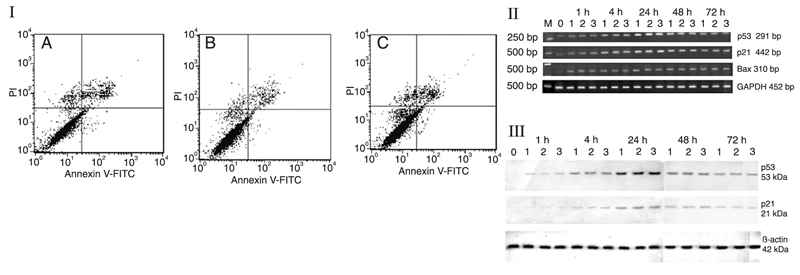We have demonstrated that a synthetic DNA enzyme targeting early growth response factor-1 (Egr-1) can inhibit neointimal hyperplasia following vascular injury. However, the detailed mechanism of this inhibition is not known. Thus, the objective of the present study was to further investigate potential inhibitory mechanisms. Catalytic DNA (ED5) and scrambled control DNA enzyme (ED5SCR) were synthesized and transfected into primary cultures of rat vascular smooth muscle cells (VSMCs). VSMC proliferation and DNA synthesis were analyzed by the MTT method and BrdU staining, respectively. Egr-1, TGF-β1, p53, p21, Bax, and cyclin D1 expression was detected by RT-PCR and Western blot. Apoptosis and cell cycle assays were performed by FACS. Green fluorescence could be seen localized in the cytoplasm of 70.6 ± 1.52 and 72 ± 2.73% VSMCs 24 h after transfection of FITC-labeled ED5 and ED5SCR, respectively. We found that transfection with ED5 significantly inhibited cultured VSMC proliferation in vitro after 24, 48, and 72 h of serum stimulation, and also effectively decreased the uptake of BrdU by VSMC. ED5 specifically reduced serum-induced Egr-1 expression in VSMCs, further down-regulated the expression of cyclin D1 and TGF-β1, and arrested the cells at G0/G1, inhibiting entry into the S phase. FACS analysis indicated that there was no significant difference in the rate of apoptosis between ED5- and ED5SCR-transfected cells. Thus, ED5 can specifically inhibit Egr-1 expression, and probably inhibits VSMC proliferation by down-regulating the expressions of cyclin D1 and TGF-β1. However, ED5 has no effect on VSMC apoptosis.
DNA enzyme; Egr-1; VSMC; Proliferation; Apoptosis









